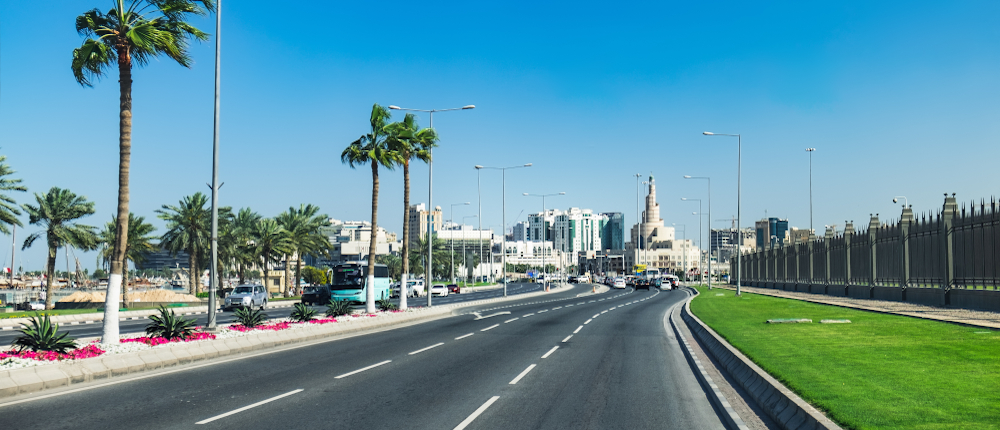The Language Barrier in Qatar
The official language of Qatar is Arabic, and the local dialect is Qatari Arabic. English is widely spoken; however all of the country’s official communication is in Arabic. For this reason, expats are advised to learn some basic words and phrases.
Qatar is made up of a considerably multi-cultural population, and as such there are many different languages to be heard. These include French, Hindi, Urdu and Malaysian.
Weather & Climate
Qatar is predominantly desert land, and as such the weather can get very hot. June, July and August are the hottest months, when temperatures reach around 43°C, and January is the coolest month at around 22°C.
With regards to extreme weather, Qatar is known to have severe sandstorms fairly regularly. In the event of a sandstorm while driving, the best advice is to pull over – as long as it’s safe – and wait for the storm to pass. If you cannot pull over, drive slowly, make sure your headlights are on, and ensure your air circulation is switched to internal instead of external. Residents and visitors are advised to have facemasks with them at all times, to put on in the event of being caught in a sandstorm while out and about, and to seek shelter.
British Embassy in Qatar
| Address: | British Embassy West Bay Dafna Area Onaiza Zone 66 Al Shabab Street PO Box 3 Doha Qatar |
| Phone: | (+974) 4496 2000 |
| Fax: | (+974) 4496 2086 |
| Website: | https://www.gov.uk/world/organisations/british-embassy-doha |
| Office hours: | Local Time Sun-Weds: 8am – 3pm Thurs: 8am – 1pm |
Emergency Services Contact Information in Qatar
| Emergency Service | Contact Number |
| Police Service | 999 |
| Fire Service | 999 |
| Ambulance Service | 999 |
Health in Qatar
In addition to ensuring that your UK-standard injections are up to date, including MMR, Tetanus, Diphtheria and Hepatitis A, visitors to Qatar might also be recommended to receive Hepatitis B and Rabies vaccinations.
Health care in Qatar is of a high standard, and many of the doctors there have been internationally trained or are expats themselves. There are both private and public hospitals, and in recent years the government has invested generously in public health care, so the standard of service is high.
Visitors and expats do not qualify for subsidised medical treatment, therefore comprehensive insurance is recommended to cover these costs. It is also possible for expats to apply for a Qatari Health Card either at a post office or an HMS clinic. For this, you will need to provide your passport, residence visa, passport-sized photos and a fee of around £20. The Health Card entitles you to considerable discounts on medical care.
Driving while Living in Qatar
British expats benefit from Qatar being a left-hand-drive country, and in general, the roads are well-maintained. Road signs are also written in both Arabic and English.
Having said this, driving in Qatar involves a lot of care and attention. Drivers need to keep a close eye on their surroundings, and expect fellow drivers to behave in unexpected ways. Traffic in Doha specifically can be a challenge, especially during rush hour. Other hazards include sandstorms, camels wandering into the roads, and extreme high temperatures in the summer mean that breaking down is more likely, and can quickly become dangerous.
Getting your Driving Licence
British drivers can use their UK licence to drive in Qatar for one week, and after this they must apply for a Temporary Licence from the Licensing Affairs Department. Another option is to obtain an International Driving Permit before arriving – this will entitle expats to drive in Qatar for six months from the date of arrival in the country.
Permanent expats are advised to exchange their home country licence to a Qatari one, which will be valid for five years. This can be done at the Ministry of Interior’s Traffic Department at Madinat Khalifa. After five years it’s a simple process to renew your Qatari licence. To exchange a UK licence for a Qatari one, the following paperwork must be supplied:
- Your existing (UK) licence
- Passport – original and copy
- A ‘no objection’ letter from your sponsor (usually your employer)
- Copy of your sponsor’s trade license
- Qatar ID card
- Copy of your sponsor’s ID
- 3x passport-sized photos
- Application form (completed in Arabic and signed by your sponsor)
You must also pay for and take an eye test at the Traffic Department, and pay a fee of around QR250 (£53) for the licence.
Legal Requirements
Residents and visitors cannot obtain a driving licence before the age of 18. Anyone caught driving without a licence in Qatar is subject to fines or even imprisonment. Insurance is also voided if you have no driving licence.
Speed in Qatar is measured in kilometres. Speed cameras are common, and limits vary between 60kph (37mph) in urban areas and up to 120kph (75mph) on highways. Many local drivers often travel at speeds above this; it’s advisable to move to one side to let them pass in this situation. Hand gestures can lead to imprisonment in Qatar, so try to suppress any road rage!
Seat belts are a legal requirement however children’s car seats are not; although children under the age of 12 must travel in the back seats of a car.


